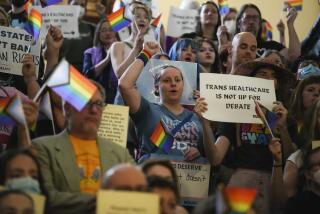Christian Science Healing Suit Dismissed
- Share via
A state appeals court, citing religious freedom guaranteed by the 1st Amendment, has upheld a lower court decision to throw out a civil lawsuit against the Christian Science Church over the death of a 12-year-old Orange County boy.
In a 2-1 decision, a Court of Appeal panel in Santa Ana decided that Christian Science followers have a right to follow their belief in spiritual healing over mainstream medicine.
The decision stems from the death of Andrew Wantland of diabetes in 1992 after attempts to treat the disease through spiritual healing failed, according to court documents.
The child’s parents were divorced and he lived with his father. His mother, Gayle Quigley, sued the church and Ruth Wantland, Andrew’s paternal grandmother, who was taking care of the boy. Quigley alleged that both parties owed the child a duty to seek medical treatment to save his life.
“Under those circumstances, imposing any duty upon Christian Science healers which require them to encourage patients to seek medical care would directly interfere with their own religious practices,” Justice William W. Bedsworth wrote for the majority July 29 in upholding the trial court’s dismissal of the case.
The three-judge panel also ruled that caretakers such as the grandmother, who was acting in the role of a baby-sitter, do not have the legal duty to seek traditional medicine to save a child’s life when the parent already has decided otherwise, according to the decision.
“In the ordinary case, imposing such a duty would encourage baby-sitters to protect themselves from liability by seeking medical care whenever a child complained of an upset stomach, headache or slight fever, even though the parent, whose knowledge of the child’s health and medical history is more comprehensive, had decided on a different course,” Bedsworth wrote.
In dissent, Justice William F. Rylaarsdam argued that Ruth Wantland assumed a duty of care toward Andrew when she undertook the role of baby-sitter. Whether she acted unreasonably in not seeking adequate medical care was a question of fact for a jury to decide, he wrote.
Quigley, who was never contacted for her consent, also sued her former husband, James Wantland, who decided to follow the course of spiritual healing. But he was dropped from the case for a reason that was not made public.
Had the court ruled for the mother, said Lee Battles, the church’s lawyer, people other than a parent would be able to take control of the decision-making process in cases involving a possible need for medical care.
“You can imagine the impact that would have on the home. All of a sudden, you would have people who are not part of the family telling parents what they should do,” Battles said. “Nobody in their rational mind would think that ought to happen.”
James Kaster, attorney for Quigley, said his client is disappointed by the ruling but will not appeal.
“We believe the [appellate] court stepped outside of its normal function,” Kaster said. “The court’s determination of facts--mainly what motivated people to do something for Andrew before his death--is troublesome to us. An appellate court is not supposed to find facts. That is normally left for a jury.”
In December 1992, Andrew began showing symptoms of diabetes, which can be treated through traditional medicine. But his father chose to rely upon Christian Science treatment, which classifies disease as an “error of the mind” and discourages the use of medicine, according to court documents.
Wantland then contacted a Christian Science health practitioner, who prayed for the boy from her home as part of his healing treatment. A few days later, Andrew’s case worsened and the father contacted 911 for emergency help. The boy died two hours later, court records show.
More to Read
Sign up for Essential California
The most important California stories and recommendations in your inbox every morning.
You may occasionally receive promotional content from the Los Angeles Times.













